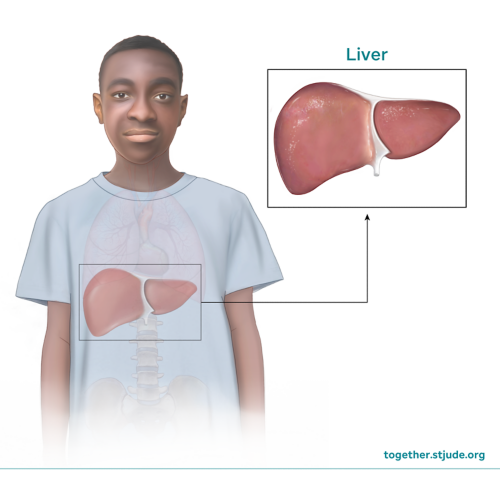Hepatitis is inflammation or swelling of the liver. It is usually caused by a viral infection. It can also be due to other causes, such as an autoimmune condition, medicines, or alcohol use.
Hepatitis can be acute (sudden) or chronic (long-lasting). Treatment for hepatitis depends on the specific type or cause.
Signs and symptoms of hepatitis include:
- Fatigue
- Loss of appetite
- Nausea or vomiting
- Fever
- Jaundice (yellowing of the skin or eyes)
- Abdominal (belly) pain
- Dark urine (pee)
- Severe itching
- Joint pain
- Pale stools (poop)
People infected with hepatitis B or C as children may develop chronic hepatitis. Most people with chronic hepatitis do not have symptoms at first. But chronic infection can damage the liver and cause scarring (cirrhosis) of the liver and other problems. In rare cases, damage can lead to liver failure.
Signs of liver damage include:
- Swelling of the liver and spleen
- Swelling or collection of fluid in the abdomen
- Jaundice
- Problems with blood clotting
There are different types of hepatitis based on the underlying cause.
Viral hepatitis
Viruses are the most common cause of hepatitis. These include:
- Hepatitis A: The hepatitis A virus spreads through contact with the stool (poop) of someone who is infected. This often happens through contaminated food or water or by not washing hands. Hepatitis A infection can cause acute hepatitis, but it can last several months. In some cases, the infection can cause liver failure. People with hepatitis A usually get better on their own without treatment. Hepatitis A can be prevented with a vaccine.
- Hepatitis B: This type of hepatitis is spread through contact with blood or body fluids. It can be passed from mother to baby during birth. The hepatitis B virus can cause acute or chronic infection. Children with hepatitis B are at higher risk for chronic hepatitis. They may not feel sick or have symptoms until liver problems develop years later. Hepatitis B can be prevented with a vaccine.
- Hepatitis C: This type of hepatitis is spread through the blood. It can cause acute or chronic infection. Hepatitis C is the most common form of chronic hepatitis. People with chronic hepatitis C may not have any symptoms until liver problems develop years later. Hepatitis C can cause liver cancer or liver failure. There is no vaccine to prevent Hepatitis C.
- Hepatitis D: This virus only infects people with Hepatitis B. If you don’t have hepatitis B, you can’t get hepatitis D. It can make symptoms and liver problems worse for people with hepatitis B. Hepatitis D is rare in the United States.
- Hepatitis E: The hepatitis E virus spreads through contact with the stool (poop) of someone who is infected. It is mainly found in parts of the world where sanitation is poor or drinking water is not clean. It is very rare in the United States.
- Epstein-Barr virus (EBV): EBV can cause infectious mononucleosis (mono) and acute hepatitis.
- Cytomegalovirus (CMV): CMV infection can cause acute hepatitis, particularly in people with weak immune systems.
Toxic hepatitis
Sometimes toxic substances can cause hepatitis. These include chemicals, poisons, and medicines. High doses of over-the-counter medicines and supplements can put stress on the liver and cause damage.
Autoimmune hepatitis
In rare cases, chronic hepatitis can develop if the immune system attacks the liver.
Alcoholic hepatitis
Heavy alcohol use can cause hepatitis over time.
Risk factors for hepatitis
Viral forms of hepatitis can be spread through contact with blood or other body fluids. Some types are spread through contaminated food or water or by not washing hands. Certain factors put a person at higher risk for viral hepatitis.
Blood product transfusion
If a person received blood products that were not screened for infections, they are at higher risk for hepatitis. Blood products are now routinely tested for Hepatitis B and C in most countries around the world. Blood products include whole blood, platelets, fresh frozen plasma, packed red blood cells, granulocytes (white blood cells), cryoprecipitate, immunoglobulin preparations (IVIG, VZIG), and bone marrow or stem cells from another person (allogeneic transplant).
In the United States, routine screening of blood donors for the hepatitis B virus began in 1971. For hepatitis C, accurate screening began in 1992.
Other risk factors for hepatitis
Risk factors vary by type of hepatitis, but general risk factors include:
- Exposure to blood or body fluids at work
- Living with or sharing personal items with someone who has hepatitis
- Unsafe sexual activity
- Treatment with blood-clotting proteins made before 1987
- Having a solid organ transplant before 1993
- Long-term kidney dialysis
- Recreational drug use, especially sharing needles
- Getting body piercings or tattoos
- Lack of safe drinking water or poor sanitation
- Traveling to areas with high rates of hepatitis infection
- Being born to a mother with hepatitis
Your health care provider will do a physical exam and health history. They may ask about risk factors and exposure including travel, blood products, alcohol and drug use, and potential contact with other people with hepatitis.
Lab tests may include tests to check for viral infection, inflammation, and liver function.
Imaging tests or scans of the liver may include ultrasound (sonogram), CT scan, or MRI.
A liver biopsy may be done to confirm diagnosis and check for liver damage.
Acute hepatitis often goes away on its own. Care for hepatitis includes rest, drinking plenty of fluids, and eating a healthy diet.
Some types of hepatitis can be treated with antiviral medicines.
Autoimmune hepatitis may be treated with medicines that suppress the immune system.
People at high risk should be screened for hepatitis. Early diagnosis and treatment of hepatitis can help prevent more serious complications. Chronic hepatitis can cause liver problems including cirrhosis, liver cancer, and liver failure. In some cases, patients may need a liver transplant.
There are steps you can take to prevent the spread of germs, including the virus that causes hepatitis. Ways to reduce your risk of hepatitis include:
- Wash hands often with soap and water, especially after using the toilet or changing diapers.
- Wear gloves if handling blood or when caring for open sores.
- Make sure sterile needles are used for tattoos and piercings.
- Do not share needles and protect yourself from needle sticks. Seek immediate medical care If you are accidentally stuck with needle.
- Do not share toothbrushes, razors, or nail clippers.
- Use a condom during sexual activity.
- Take care when traveling to areas where sanitation is poor. Drink bottled water and avoid raw or undercooked foods.
- Get vaccinated for hepatitis A and hepatitis B if your health care provider recommends it.
To maintain good liver health, patients should:
- Drink plenty of water.
- Eat a healthy diet that is high in fiber.
- Reduce intake of fatty, salty, smoked, and cured foods.
- Do not take medicines more often than needed or in doses higher than prescribed.
- Be careful about using herbs and natural supplements.
- Avoid drinking alcohol, using illegal drugs, or mixing drugs and alcohol.
- Avoid exposure to chemicals such as household cleaners, insecticides, and paint thinners.
Questions to ask your care team




